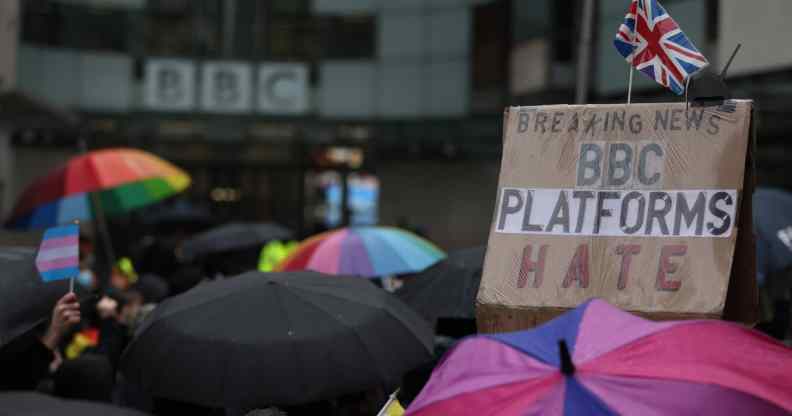BBC accused of being ‘gender-critical mouthpiece’ after platforming anti-trans group

Demonstrators attend the Trans Activism UK’s ‘British Bigotry Corporation: Platforming Hate Is Not Impartial’ protest at BBC Broadcasting House, 2021. (Hollie Adams/Getty)
The BBC has been labelled “a mouthpiece for the right-wing and the gender critical” for platforming an anti-trans lobby group – again.
The largest LGBTQ+ event in Wales, Pride Cymru, took place on Saturday (27 August) in Cardiff. Celebrations were temporarily halted by anti-trans protesters from Get The L Out UK, who held banners reading “TransActivism Erases Lesbians”, “Lesbians Don’t Like Penises” and blocked the pride march, forcing police to step in.
Following the incident, the BBC published a short article on the disruption including quotes from Pride Cymru organisers and South Wales Police, which said it was “required to engage with a small protest group who had assembled themselves on the route to block the procession”.
Over the next few hours the article was updated several times, archives accessed via the Wayback Machine, first highlighted by trans rights advocate @mimmmymum, show.
First, this was to include a quote from Get The L Out UK co-founder Angela Wild, who insisted that “same-sex attraction is now becoming a hate crime”.
The BBC also included a link to the anti-trans group’s website in its “related internet links” section under the article, although it did not include Pride Cymru’s website.
The final version of the article includes even more comment from Wild, who said: “The needs of lesbians are in direct contradiction with men who identify as women.
“As soon as lesbians say that, we get called transphobic and we need to open a discussion on that as a start.”
The edits to the story, gradually giving increasing prominence to Get The L Out, drew swift criticism, with advocates calling into question the BBC’s independence, especially on issues of trans rights.
Steph Richards, founder of the trans advocacy organisation Steph’s Place UK, told PinkNews: “The BBC has become a mouthpiece for the right-wing and the gender critical, and its editing process is a complete sham.
“The purpose of their output is to create division and deflection within a country that is heading for a crisis.
“The escalation of the story involving Get The L Out at Pride Cymru just backs up the revelations from Emily Maitlis that the BBC are no longer independent, nor indeed can be trusted.”
Maitlis, the former Newsnight presenter who quit the BBC this year, said on 24 August that an “active agent of the Conservative Party” is shaping the broadcaster’s news output, referring to current BBC board member and former No 10 communications director Robbie Gibb.
Stop Funding Hate, a pressure group which calls on advertisers to pull content from publications which encourage hateful rhetoric, also raised concerns about “institutional transphobia and racism” within the BBC.
In 2021, the BBC faced intense backlash for an article that claimed trans women were pressuring cisgender lesbians into sex, which included an interview with Lily Cade, an openly transphobic former porn performer and director who had been accused by multiple women of sexual assault.
The story did not contain a single interview with anyone who disagreed that trans women are a threat to lesbians, but the BBC doggedly insisted that the article was impartial and subject to a “rigorous editorial process”, and continued to defend the non-existent issue as “worthy of investigation”.
The article resulted in protests outside BBC offices in several cities and queer staff resigning in droves, but it was only when Cade wrote blog posts calling for the “lynching” and “execution” of trans women that she was removed from the article.
The BBC has also been criticised for uncritically platforming the LGB Alliance in the past.
In a 2020 exposé by HuffPost UK, dozens of Black current and former BBC employees spoke out about bullying and a “toxic working environment” for people of colour employed by the broadcaster.
A BBC spokesperson said: “We take our responsibility to report accurately and with due impartiality very seriously. As with the coverage of any developing news event, the content of the story was updated as the story evolved, which is standard practice. Editor’s notes are issued for corrections and clarifications.”

